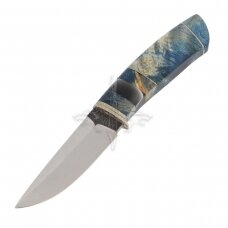N690 Böhler Uddeholm
-
1 - 6 of 6Japanese knife KAIKEN MoonLightCode: 4865-N690CoModelKAIKEN 懐剣
Blade SteelN690Co Böhler Uddeholm
Hardness of steel, HRC60 - 61
390€Japanese knife stick TANTŌ N690, caucasian walnut tree, brassCode: 4823_N690ModelTANTŌ
Blade SteelN690 Böhler Uddeholm
Hardness of steel, HRC60 - 61
420€Japanese knifestick TANTŌ N690, karelian birch, brassCode: 4822_N690-TantoModelTANTŌ
Blade SteelN690 Böhler Uddeholm
Hardness of steel, HRC60 - 61
420€Knife “ANGIS-2” N690 Böhler Uddeholm, elk horn, bronzeCode: RL002_angis-2ModelANGIS
Blade SteelN690 Böhler Uddeholm
Hardness of steel, HRC59 - 60
340€Sold out Contact usHunting and Fishing Knife ‘Blue Hunter’ 2; N690 Böhler Uddeholm; Stabilized Karelian Birch; TitaniumCode: BH2_N690ModelSKINNER
Blade SteelN690 Böhler Uddeholm
Hardness of steel, HRC60 - 61
320€Sold out Contact usHunting and Fishing Knife ‘Blue Hunter’ 1; N690 Böhler Uddeholm; Stabilized Karelian Birch; TitaniumCode: BH1_N690ModelSKINNER
Blade SteelN690 Böhler Uddeholm
Hardness of steel, HRC60 - 61
320€Sold out Contact us -
N690 steel is manufactured by Böhler companies in Austria, Germany and Russia. This alloy is martensitic steel with an addition of cobalt. Other brands do not have an analogue to this material - it shares mutual features with 440 series steel, but overall, Austrian stainless steel with cobalt is unique.
Properties of N690 steel
N690 steel has a wide range of applications. However, in terms of knife making, its operational properties are decent for models intended for use in challenging conditions. That is why this steel is applied in making tactical or survival knives. These knives can withstand high impacts and lateral loads. The steel’s average hardness is HRC 59-62.
Advantages of knives made from N690 steel:• Resistance to the spread of corrosion – under normal conditions, the material is not destroyed by rust, which is principle for both hunting and kitchen knives;
• High strenght;
• Resistance to breakage and torsional loads;
• Good retention of sharpness.
Chemical Composition:
* Carbon 1.08% - necessary to increase the strength of the metal. It gives the alloy the required hardness.
* Chromium 17.30% – ensures breakage resistance and increases steel hardness. Due to the high chromium content, N690 steel is stainless.
* Molybdenum 1.10% – is needed to reduce brittleness. This fire-resistant element ensures the material’s strength and resistance to high temperatures.
* Vanadium 0.10% - is an alloying element for particular types of steel. It increases elasticity. Along with chromium, it ensures resistance to corrosion and friction. Due to vanadium, steel blades maintain integrity even in aggressive environments.
* Cobalt 1.50% - is a pivotal alloying element for stainless steel. It assures better mechanical properties and heat resistance, which is significant for any processing tool.
* Manganese 0.40% – positively affects hardness and strength properties.
* Silicon 0.40% - is an additive that increases the wear resistance of N690 steel and increases the alloy's strength, stability, and reliability.Reliable N690 steel is an excellent material for tactical and long knives, and kitchen knives – in any case, such products can work under extreme conditions with various loads. Due to its resistance to aggressive environments and moisture, N690 steel is used in underwater fishing and diving equipment – harpoons, knives and others. Also, its resistance to water and aggressive chemicals allows N690 steel to be used in manufacturing medical and food- cutting tools and various grinders.












